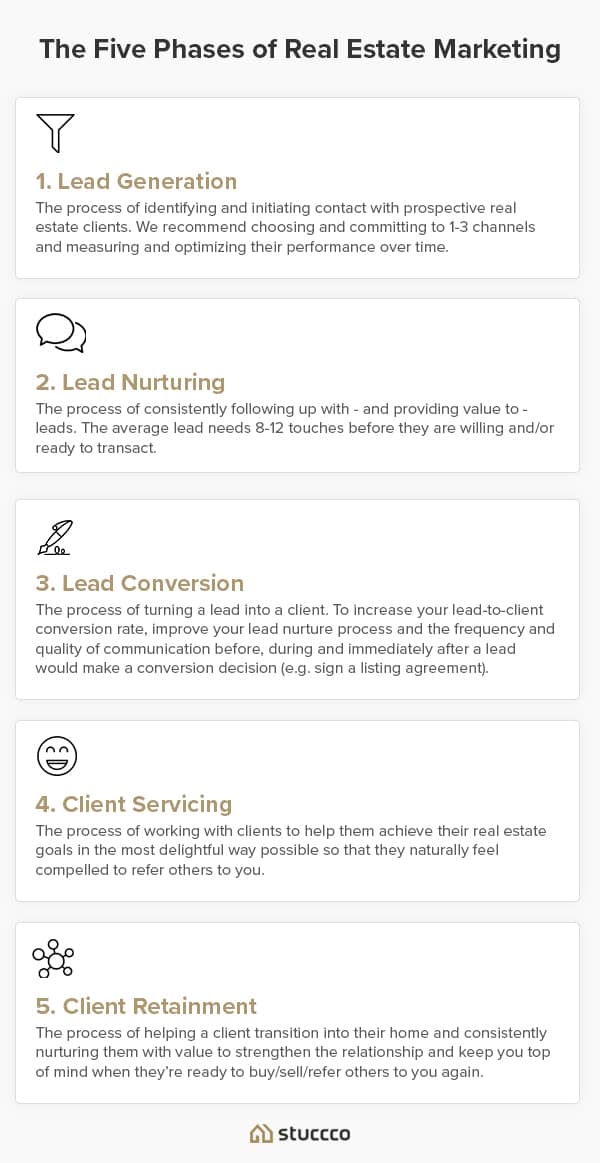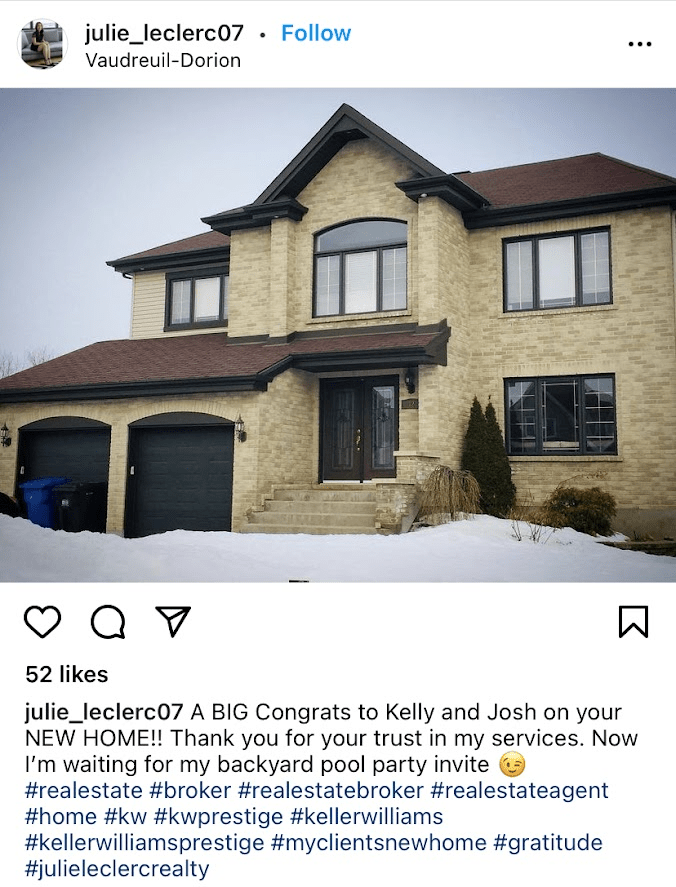How to Convert Real Estate Leads Into Sales: 10 Real Estate Lead Conversion Tips
As a real estate agent, you can spend a lot of time, money, and effort trying to get leads. Real estate is a tough industry because agents are oftentimes paying and competing for the same business opportunities. If you don’t know how to convert leads into sales, you can pour a lot of resources down the drain. In this article, we’ll cover 10 ways to convert real estate leads into closed deals so your resources can be maximized instead of wasted.
- Five Phases of Real Estate Marketing
- Two Considerations When Nurturing New Leads
- What to Do When You Get a New Real Estate Lead
- What NOT to Do When You Get a New Real Estate Lead
- What to Do After Converting a Real Estate Lead
The 5 Phases of Real Estate Marketing
Let’s start with developing an accurate understanding of what real estate marketing is (i.e. the process of getting new clients and growing your business).
There are five primary stages of real estate marketing:
- Lead generation
- Lead nurturing
- Lead conversion
- Client servicing
- Client retainment

The first part of the process, of course, is lead generation. Real estate leads, or prospects, are people who have the potential to eventually turn into a real estate client. This is a vital part of growing a real estate business because without a pipeline of leads you have zero chance of generating income.
If you don’t already have a proven lead generation strategy, read our breakdown of the top 20 ways to generate new real estate leads.
Nurturing a Lead vs. Converting a Lead
Nurturing real estate leads means following up and building a genuine connection with a prospect. You’ll hear all about leads, leads, and more leads as a real estate professional, but never forget that every lead is a human being - not a number or an entry on a spreadsheet.
You must nurture your leads if you want them to become clients (ie convert).
When you think about it, there’s nothing you can do to force or guarantee leads will become clients. Lead conversion is out of your control - lead nurturing is a process that you can control and improve on, which can help increase the likelihood that your leads will turn into clients (ie your lead:client conversion rate will increase).
2 Considerations When Nurturing Your Real Estate Leads
1. Real Estate Leads vs. Real Estate Prospect
“Leads” and “prospects” are terms often used interchangeably to describe potential clients. In fact, some real estate agents and brokers don’t know that there is a difference between the meaning of these terms and will mistakenly use the terms interchangeably.
A real estate lead is someone who could eventually convert into a sale. With this definition, you could potentially count all of your friends and family members as real estate leads.
On the other hand, a real estate prospect is someone who you have already made a personal connection with and is likely to buy or sell a property in the near future.
Of course, it’s wise to have both leads and prospects but make sure you follow up with them differently.
Here’s an example: Let’s say Person A reaches out to you because they want to start gathering information about the home buying process but they aren’t planning to buy a house for two years. If you start sending them texts, emails and calling them every day offering your support, they’re going to get frustrated quickly - and potentially block you from being able to send them future messages.
On the other hand, let's say Person B is eager to visit a house they saw on Zillow in the next 24 hours. If you send them an email every week, they’re going to get frustrated and find a different agent who responds more quickly and matches their urgency.
In these examples, Person A would be considered a lead while Person B would be considered a prospect.
While you generate new leads and nurture your real estate leads into prospects (and hopefully eventual clients), make sure you have an accurate understanding of their timelines, needs and expectations so you can tailor your communication and services accordingly.
2. The Lead Source Affects Your Conversion Rate
The National Association of Realtors® (NAR) estimates that the average real estate lead conversion rate is 0.4%-1.2%. However, not all leads are created equal.
There are so many different ways to generate leads - from knocking on doors, running physical and online real estate ads, creating referral partnerships, or getting referrals from previous clients. As a result, your leads have an extremely wide range of understanding and conversion potential.
For example, let's say you have previous clients who are absolutely ecstatic about the way you helped them. If you get a phone call from their best friends who have heard all the positive things about you, they’ll likely convert into a client. In fact, you may not need to do much nurturing to achieve this lead conversion.
On the other hand, a lead who is absentmindedly scrolling through Zillow and decides to click, “Contact Agent” just for fun will have a much lower chance of converting into a client.
Internet leads oftentimes take over a year to nurture before they become a prospect. This doesn't necessarily mean that internet leads are not the right type of real estate lead for you and your business - it just means you should be aware of their typical expectations and behaviors so you can personalize your nurturing strategy accordingly.
When you’re planning your real estate lead generation and nurturing strategies, consider the lead source and conversion rates.
Related: How to Get More Real Estate Listing Leads (11 Proven Strategies)
What to Do When You Get a New Real Estate Lead
Regardless of where a real estate lead comes from, you should quickly make a personal connection with them.
1. Quickly Connect with a New Lead
The internet is a great place for people to find you and it’s amazing when a previous client or professional sends potential clients your way. But if a lead doesn’t get a chance to talk with you when they need help, they’ll never become your client.
When you get a new real estate lead - especially a new real estate lead from the internet - you should try to contact them as fast as you can, ideally within five minutes. If you don’t follow up quickly, someone else will.
If the lead doesn’t answer your call or if you’re unable to make a phone call immediately, then send a personalized text message and/or email.
To make it as easy as possible for you to jump on the phone or send a message, use a phone script or messaging template. Then, when it’s time to speak with a new lead, you’ll feel comfortable doing so. You can write your own phone and message template, search for existing ones online or ask a fellow agent what’s worked well for them.
If the lead doesn’t respond to your follow-up attempt, follow up with them again. Only 40% of leads will respond to the first follow-up attempt but 85% of them will respond by the sixth attempt (source).
2. Ask Open-Ended Questions
In your first conversation with a lead, you should do much, much more listening than talking (~90% listening and 10% talking). Ask the lead about their current situation and their desired outcome. Ask what they are looking for in a future property, about their timelines, and what concerns they have about the process. This is a great way to show them that you care and want to help them.
Asking questions also helps you...
3. Qualify the Lead
Remember there’s a significant difference between a lead and a prospect. Determining how close your lead is to making a real estate transaction should dictate your follow-up frequency and overall strategy.
Use all the information you can get from your new lead to customize and personalize all of your follow-ups. While automated follow-up sequences can be effective, nurturing a lead means that you need to develop trust and rapport with your potential clients, which can’t be done entirely through automations. Instead, use automations to streamline your processes, not to replace the connection you have with the lead.
4. Offer Legitimate Support
On a good day, only one out of every two new leads will pick up the phone. Many people avoid phone calls from salespeople and real estate agents because they expect to be pushed into something even if they need and want help.
There’s a big difference between giving a lead all of the info they need to comfortably and confidently make a decision for themselves to work with you in comparison to pushing them to make a decision.
As you continue to follow-up with leads and prospects and develop your nurture systems, you’ll get a better feel for what each lead needs to grow their trust in you.
5. Implement a Nurture System
Many well-intentioned agents tell themselves that they’ll continue to nurture leads by calling them in the future. However, if you don’t have a written plan, your follow-up strategy will ultimately fail.
In order to effectively convert real estate leads into sales, you need a nurture system.
The good news is that you don’t need to develop a full-scale nurture system from scratch or on your own. First, check with your real estate brokerage. It’s very possible that they can give you access to a CRM (Customer Relationship Management) or marketing automation software with customizable nurture campaigns.
If not, there are a lot of tools that can generate a nurture system easily. A few of our favorites are:
- HighLevel
- HubSpot CRM
- Follow Up Boss
What Not to Do When You Get a New Real Estate Lead
1. Think of Leads as Dollar Signs
It sounds simple, but this can actually be a very difficult shift for many real estate agents, especially new agents or those desperate for a quick transaction. Even though each new lead can lead you to earning thousands of dollars, this mentality will lead to conversations that feel ingenuine and hurt you in the long-term.
When you're connecting with a new lead for the first time, you’re also reaching out to a complete stranger. Focus on building your friendship with this new lead instead of jumping 10 steps ahead to your payday. In short, think about how you can help them, not how they can help you.
2. Talk Only About Real Estate
If you read through positive reviews that buyers and sellers leave for their real estate agents, you’d notice some patterns. Of course, clients love when you can sell their house for more money and they love when you get the best deal on the purchase of a new home.
But what you’ll also notice is that the vast majority of happy customers felt truly connected to and cared for by their agent. In the end, their relationship with the agent doesn’t feel like a strict, corporate relationship - it feels like a friendship.
Although you may not want to hear about the life story of all of your leads (and we would recommend that you don’t talk about yours), you should be relaxed enough to talk about their families, jobs, and the ways that you relate to them.
3. Rush Them
The quickest way to ruin your relationship with a potential real estate client is by rushing them into a real estate transaction. Buying and selling a house is most likely the biggest transaction of their lives, so it should be taken seriously.
Remember that many of your real estate leads will only be interested in gathering information when you first contact them. That means that they won’t be ready to tour houses or invite you over to look at theirs. Instead, shift your conversations and follow-up strategy to give them as many helpful tips and resources as you can.
What To Do After Converting a Real Estate Lead into a Sale
You did it! Every real estate closing is a successful conversion. But your follow-up strategy shouldn’t end here.
According to the NAR, 41% of home sellers find their agent through a referral from a friend. Referrals have been the top source of real estate leads for decades.
On top of following up with potential clients, you should also be following up with previous clients and making sure that you are always available when they have friends and family members to send your way.
You can also make sure that you’re sharing your past client wins to market yourself as a real estate agent. Gather testimonials from every client and ask for honest feedback so you can continue to improve the way you carry yourself and run your business.
For homebuyers and listing clients, you can and should use images of the property in your marketing. As long as you have your client’s permission, you can share an image of the new home that you helped your buyer’s purchase.

For listing clients, use before and after images of virtual staging to showcase your expertise and ability to get the maximum price for your clients. Sharing your listing marketing strategy will help them to trust you.

Virtually staged bedroom by Stuccco
Virtual staging only takes 24 hours and sells houses for money in less time - try it today!


